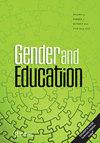Queering the glass ceiling: alpha females, cyborgs, and the non-tenure track in science
IF 1.9
3区 教育学
Q2 EDUCATION & EDUCATIONAL RESEARCH
引用次数: 0
Abstract
ABSTRACT This inquiry into the nature of feminist solidarity in the academic sciences is guided by the intra-activity of gendered bodies in teaching-intensive faculty positions. It uses diffractive methodology to examine how response-able research practice can account for enactment of social discourse through agential cuts. Over the course of a two-year ethnography in a university with high research activity, gender performativity in the contested space of feminized teaching and masculine science was analysed. This article aims to make visible how researcher subjectivities entangle with data collection. Results show how specific agential cuts – alpha female, silencing, less-than-person, squashing passion, and staying to get tenure – illuminate a unique diffractive pattern. The pattern troubles structural notions of feminist solidarity, as ethnographic participants marginalized by institutional hierarchies survive by queering it. Furthermore, the inquiry gestures towards a humble, local, and tentative contribution to post-human theorizing on ‘queering the glass ceiling’.打破玻璃天花板:女性领袖、电子人,以及科学领域的非终身教职
对学术科学中女权主义团结本质的探究是以教学密集型教师职位中性别主体的内部活动为指导的。它使用衍射方法来检查如何响应的研究实践可以解释通过代理削减社会话语的制定。在一所研究活跃的大学进行为期两年的人种学研究期间,研究人员分析了女性化教学和男性化科学竞争空间中的性别表现。本文旨在揭示研究者的主观性是如何与数据收集纠缠在一起的。结果显示,具体的机构裁员——女性领袖、沉默、不如人、压制激情、留下来获得终身职位——阐明了一种独特的衍射模式。这种模式扰乱了女权主义团结的结构性概念,因为被制度等级边缘化的人种学参与者通过使其变得怪异而得以生存。此外,该研究对“打破玻璃天花板”的后人类理论做出了谦逊、局部和试探性的贡献。
本文章由计算机程序翻译,如有差异,请以英文原文为准。
求助全文
约1分钟内获得全文
求助全文
来源期刊

Gender and Education
EDUCATION & EDUCATIONAL RESEARCH-
CiteScore
5.20
自引率
9.10%
发文量
31
期刊介绍:
Gender and Education grew out of feminist politics and a social justice agenda and is committed to developing multi-disciplinary and critical discussions of gender and education. The journal is particularly interested in the place of gender in relation to other key differences and seeks to further feminist knowledge, philosophies, theory, action and debate. The Editors are actively committed to making the journal an interactive platform that includes global perspectives on education, gender and culture. Submissions to the journal should examine and theorize the interrelated experiences of gendered subjects including women, girls, men, boys, and gender-diverse individuals. Papers should consider how gender shapes and is shaped by other social, cultural, discursive, affective and material dimensions of difference. Gender and Education expects articles to engage in feminist debate, to draw upon a range of theoretical frameworks and to go beyond simple descriptions. Education is interpreted in a broad sense to cover both formal and informal aspects, including pre-school, primary, and secondary education; families and youth cultures inside and outside schools; adult, community, further and higher education; vocational education and training; media education; and parental education.
 求助内容:
求助内容: 应助结果提醒方式:
应助结果提醒方式:


